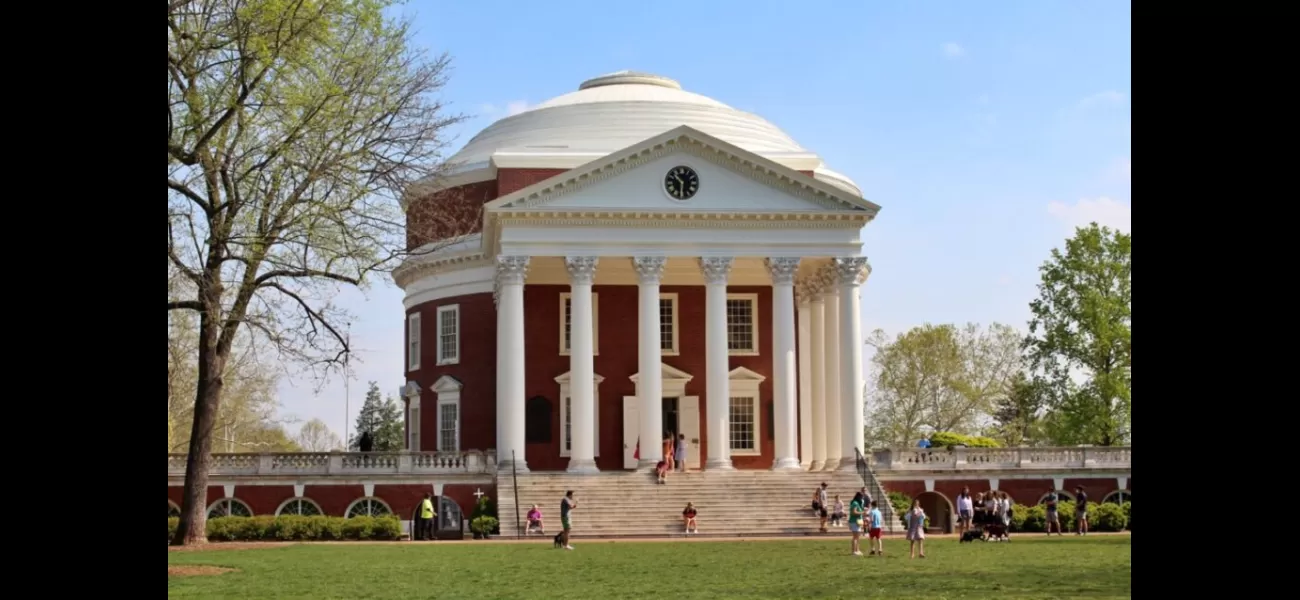Virginia has passed a law prohibiting public universities from considering family ties or alumni status in their admissions process.
New law removes donor/alumni factor in college admissions.
March 11th 2024.

In a groundbreaking move, Virginia has become the second state to eliminate legacy admissions in the college admissions process. Governor Glenn Youngkin signed House Bill 48 on March 8, making it illegal for colleges to give preferential treatment to applicants based on their family connections or alumni status. This decision was unanimously passed by Virginia's legislative bodies, marking a significant step towards promoting fairness and diversity in higher education.
The issue of legacy admissions has been a contentious one, especially after the Supreme Court's ruling on affirmative action. Many believed that legacy admissions would be the next target, but progress has been slow due to ongoing backlash against diversity and inclusion efforts. Scripps News reports that only two states, Virginia and Colorado, have banned legacy admissions so far. However, some universities have taken independent steps to end the practice, and in Virginia, private institutions can still use legacy preferences if they choose to.
Senator Tim Kaine expressed hope that Virginia's actions would spark a nationwide movement to eliminate legacy admissions. He tweeted, "Proud to see Virginia leading the way in banning legacy admissions in colleges and universities. Now, it's time for Congress to pass my bipartisan bill to do the same across the country." Kaine's sentiments were echoed by Senator Todd Young, who also introduced legislation in November 2023 to end legacy admissions through an amendment to the Higher Education Act.
Their bill, the Merit-Based Educational Reforms and Institutional Transparency Act, aims to prevent accredited colleges and universities from giving preferential treatment in the admissions process. According to Senator Young, "America is a land of opportunity, not a land of aristocracy. Legacy admissions limit opportunities for bright and talented young Americans and provide an unfair advantage to those with connections." Senator Kaine added that a student's acceptance into a college should not be based on their parents' attendance or donations.
Some argue that the abolishment of legacy admissions could have wider implications and potentially lead to discussions about reparations. The New Yorker highlighted the fact that many of the nation's top universities did not admit Black students in significant numbers until the 1960s and 1970s. As a result, Black people have only had about two generations of alumni representation, despite being in America since its inception.
Jeannie Suk Gersen, a writer for The New Yorker, believes that ending legacy admissions could pave the way for a more meaningful conversation about equity in higher education. She wrote, "Once the language of affirmative action is removed, and schools are no longer bound to talk about race in terms of diversity or a holistic evaluation, we can have a more honest and substantive discussion about equity." This could include factors such as being descended from enslaved people, facing severe disadvantages, and coming from a low-income or first-generation college background.
In light of these issues, the Department of Education has launched an investigation into legacy admissions at Harvard University. This move aligns with the ongoing efforts to promote fairness and diversity in higher education and ensure that all students have an equal chance of success. Virginia's decision to ban legacy admissions sets a powerful precedent, and it is hoped that other states will follow suit in the near future.
The issue of legacy admissions has been a contentious one, especially after the Supreme Court's ruling on affirmative action. Many believed that legacy admissions would be the next target, but progress has been slow due to ongoing backlash against diversity and inclusion efforts. Scripps News reports that only two states, Virginia and Colorado, have banned legacy admissions so far. However, some universities have taken independent steps to end the practice, and in Virginia, private institutions can still use legacy preferences if they choose to.
Senator Tim Kaine expressed hope that Virginia's actions would spark a nationwide movement to eliminate legacy admissions. He tweeted, "Proud to see Virginia leading the way in banning legacy admissions in colleges and universities. Now, it's time for Congress to pass my bipartisan bill to do the same across the country." Kaine's sentiments were echoed by Senator Todd Young, who also introduced legislation in November 2023 to end legacy admissions through an amendment to the Higher Education Act.
Their bill, the Merit-Based Educational Reforms and Institutional Transparency Act, aims to prevent accredited colleges and universities from giving preferential treatment in the admissions process. According to Senator Young, "America is a land of opportunity, not a land of aristocracy. Legacy admissions limit opportunities for bright and talented young Americans and provide an unfair advantage to those with connections." Senator Kaine added that a student's acceptance into a college should not be based on their parents' attendance or donations.
Some argue that the abolishment of legacy admissions could have wider implications and potentially lead to discussions about reparations. The New Yorker highlighted the fact that many of the nation's top universities did not admit Black students in significant numbers until the 1960s and 1970s. As a result, Black people have only had about two generations of alumni representation, despite being in America since its inception.
Jeannie Suk Gersen, a writer for The New Yorker, believes that ending legacy admissions could pave the way for a more meaningful conversation about equity in higher education. She wrote, "Once the language of affirmative action is removed, and schools are no longer bound to talk about race in terms of diversity or a holistic evaluation, we can have a more honest and substantive discussion about equity." This could include factors such as being descended from enslaved people, facing severe disadvantages, and coming from a low-income or first-generation college background.
In light of these issues, the Department of Education has launched an investigation into legacy admissions at Harvard University. This move aligns with the ongoing efforts to promote fairness and diversity in higher education and ensure that all students have an equal chance of success. Virginia's decision to ban legacy admissions sets a powerful precedent, and it is hoped that other states will follow suit in the near future.
[This article has been trending online recently and has been generated with AI. Your feed is customized.]
[Generative AI is experimental.]
0
0
Submit Comment





